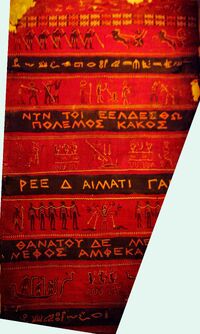JamesyWamesy (talk | contribs) (Greek) |
No edit summary |
||
| (17 intermediate revisions by 10 users not shown) | |||
| Line 6: | Line 6: | ||
| LastSeen={{ep|6x01}} |
| LastSeen={{ep|6x01}} |
||
| Owned=[[Jacob]] |
| Owned=[[Jacob]] |
||
| − | | Found=[[ |
+ | | Found=[[The Man in Black]] and [[Ben]] |
| Used= |
| Used= |
||
}} |
}} |
||
| − | Besides a [[Jacob's tapestry|tapestry]], [[Jacob]] also wove a '''rug''' of thread he spun himself in his [[Jacob's Chamber|chamber]] in the |
+ | Besides a [[Jacob's tapestry|tapestry]], [[Jacob]] also wove a '''rug''' of thread he spun himself in his [[Jacob's Chamber|chamber]] in the pedestal of the [[statue of Taweret]] during his many years on the Island. A better view was provided by the [[Lost: The Complete Fifth Season (DVD)|LOST Season 5 DVD]]. |
| + | [[The Man in Black]] tore off a corner of the rug and used it to clean the bloodied knife that [[Ben]] had used to stab Jacob. {{crossref|6x01}} |
||
| − | |||
| − | + | {{I|I=Jacobsrug.jpg|w=200|a=left|c=The rug}} |
|
| + | {{clear}} |
||
| + | ==Pictorial images== |
||
| + | *A man with a staff guards two times five [[Restraints|chained]] figures. |
||
| + | *The bottom section shows a boat with three figures, with the central figure seeming to be imprisoned. |
||
==Greek== |
==Greek== |
||
| − | The first line reads ΝΥΝ ΤΟΙ ΕΕΛΔΕΣΘΩ ΠΟΛΕΜΟΣ ΚΑΚΟΣ. The line comes from |
+ | * The first line reads ΝΥΝ ΤΟΙ ΕΕΛΔΕΣΘΩ ΠΟΛΕΜΟΣ ΚΑΚΟΣ. The line comes from Homer's ''Iliad'', Book 16, line 494, and modified to lowercase reads, "νῦν τοι ἐελδέσθω πόλεμος κακός" (transliterated as "nun toi eeldesthō polemos kakos"), meaning, ''"Now you must embrace this evil war"''. |
| + | * The second line reads ΡΕΕ Δ ΑΙΜΑΤΙ ΓΑΝΑ. This line comes from the ''Iliad'' Book 4, line 451, and modified to lowercase reads, "ρεε δ' αϊματι γανα" (transliterated as "ree d'aimati gana"), meaning, ''"the ground ran with blood"''. |
||
| − | |||
| − | The |
+ | * The third line reads ΘΑΝΑΤΟΥ ΔΕ ΜΕΛΑΝ ΝΕΦΟΣ ΑΜΦΕΚΑΛΥΨΕΝ. This also comes from the ''Iliad'', Book 16, line 350, and modified to lowercase reads, "θανάτου δὲ μέλαν νέφος ἀμφεκάλυψεν" (transliterated as "thanatou de melan nephos amphekalupsen"), meaning, ''"then death's black cloud enveloped"''. |
| + | {{brclear}} |
||
| − | |||
| − | The visible parts of the third line read ΘΑΝΑΤΟΥ ΔΕ ΜΕ... ΝΕΦΟΣ ΑΜΦΕΚΑ..., modified to lowercase reads, "θανατου δε με... νεφος αμφεκα..." (transcribed as "thanatou de me... nephos ampheka..."). |
||
==See also== |
==See also== |
||
* [[Jacob's tapestry]] |
* [[Jacob's tapestry]] |
||
{{Nav-Jacob}} |
{{Nav-Jacob}} |
||
| + | |||
| + | [[es:Alfombra de Jacob]] |
||
[[Category:Items]] |
[[Category:Items]] |
||
Latest revision as of 02:09, 31 October 2011
Besides a tapestry, Jacob also wove a rug of thread he spun himself in his chamber in the pedestal of the statue of Taweret during his many years on the Island. A better view was provided by the LOST Season 5 DVD.
The Man in Black tore off a corner of the rug and used it to clean the bloodied knife that Ben had used to stab Jacob. ("LA X, Part 1")

The rug
Pictorial images
- A man with a staff guards two times five chained figures.
- The bottom section shows a boat with three figures, with the central figure seeming to be imprisoned.
Greek
- The first line reads ΝΥΝ ΤΟΙ ΕΕΛΔΕΣΘΩ ΠΟΛΕΜΟΣ ΚΑΚΟΣ. The line comes from Homer's Iliad, Book 16, line 494, and modified to lowercase reads, "νῦν τοι ἐελδέσθω πόλεμος κακός" (transliterated as "nun toi eeldesthō polemos kakos"), meaning, "Now you must embrace this evil war".
- The second line reads ΡΕΕ Δ ΑΙΜΑΤΙ ΓΑΝΑ. This line comes from the Iliad Book 4, line 451, and modified to lowercase reads, "ρεε δ' αϊματι γανα" (transliterated as "ree d'aimati gana"), meaning, "the ground ran with blood".
- The third line reads ΘΑΝΑΤΟΥ ΔΕ ΜΕΛΑΝ ΝΕΦΟΣ ΑΜΦΕΚΑΛΥΨΕΝ. This also comes from the Iliad, Book 16, line 350, and modified to lowercase reads, "θανάτου δὲ μέλαν νέφος ἀμφεκάλυψεν" (transliterated as "thanatou de melan nephos amphekalupsen"), meaning, "then death's black cloud enveloped".
See also
| ||||||||||||||||||||||||

